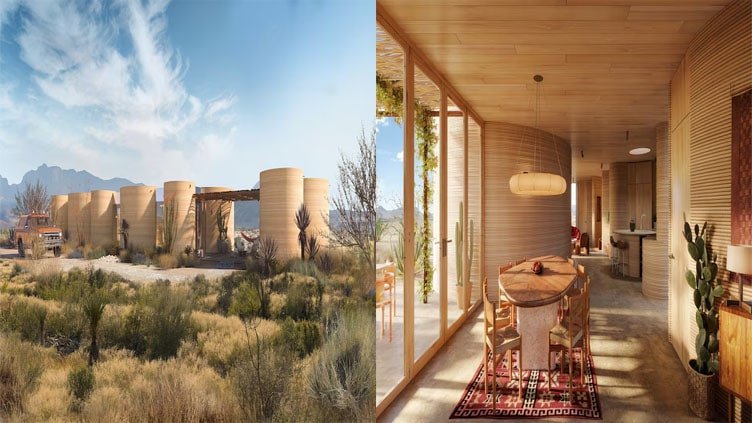A groundbreaking project is underway in the Texan desert, where El Cosmico, an eclectic hotel and campground in Marfa, is expanding with the world’s first 3D-printed hotel. The ambitious venture, led by hotel owner Liz Lambert, 3D printing company ICON, and architects Bjarke Ingels Group, will add 43 hotel units and 18 residential homes across a 40-acre site.
The project is revolutionizing traditional construction methods. Lambert explains that 3D printing offers an unparalleled level of design freedom, allowing for unique architectural features that would be cost-prohibitive with conventional building techniques. “Most hotels are confined by repetitive designs, but this technology lets us explore fluid shapes and intricate structures like curves, domes, and parabolas,” Lambert said.
The innovative construction is made possible by ICON’s Vulcan, a massive 3D printer measuring 46.5 feet wide and 15.5 feet tall. Weighing 4.75 tons, the printer uses Lavacrete, a proprietary cement-based material specially formulated for durability and large-scale printing. The printer’s size and capability allow it to create the 12-foot-high walls of the hotel units and homes with remarkable precision.
As the Vulcan 3D printer builds layer by layer, it extrudes Lavacrete, which is adapted to local weather conditions. ICON CEO Jason Ballard explains that factors like humidity, temperature, and sunlight influence the mixture’s properties, requiring workers to fine-tune the blend for optimal performance and consistency. The resulting structures feature smooth, curvaceous walls that are both visually striking and structurally sound.
The 3D-printed expansion includes a variety of units, from single-room hotel spaces to larger, three-bedroom homes. The technology allows for the incorporation of complex designs that would typically be too expensive or time-consuming to replicate on a large scale. This approach not only reduces construction time but also makes it feasible to build aesthetically unique and durable structures at a more affordable price point.
While the project promises to set a new standard for innovative construction, it also raises concerns about the future of traditional labor roles in the building industry. Milad Bazli, a lecturer in science and technology at Charles Darwin University, points out that widespread adoption of 3D-printed construction could potentially displace skilled labor jobs, especially in remote or underserved areas.
Despite these challenges, the team behind El Cosmico is optimistic about the future of 3D-printed architecture. The expansion is set to be completed by 2026, with hotel units expected to be available for nightly rates ranging from $200 to $450. The project not only highlights the potential of 3D printing to revolutionize the construction industry but also serves as a showcase for how technology can be used to create sustainable and imaginative spaces.
READ MORE:
